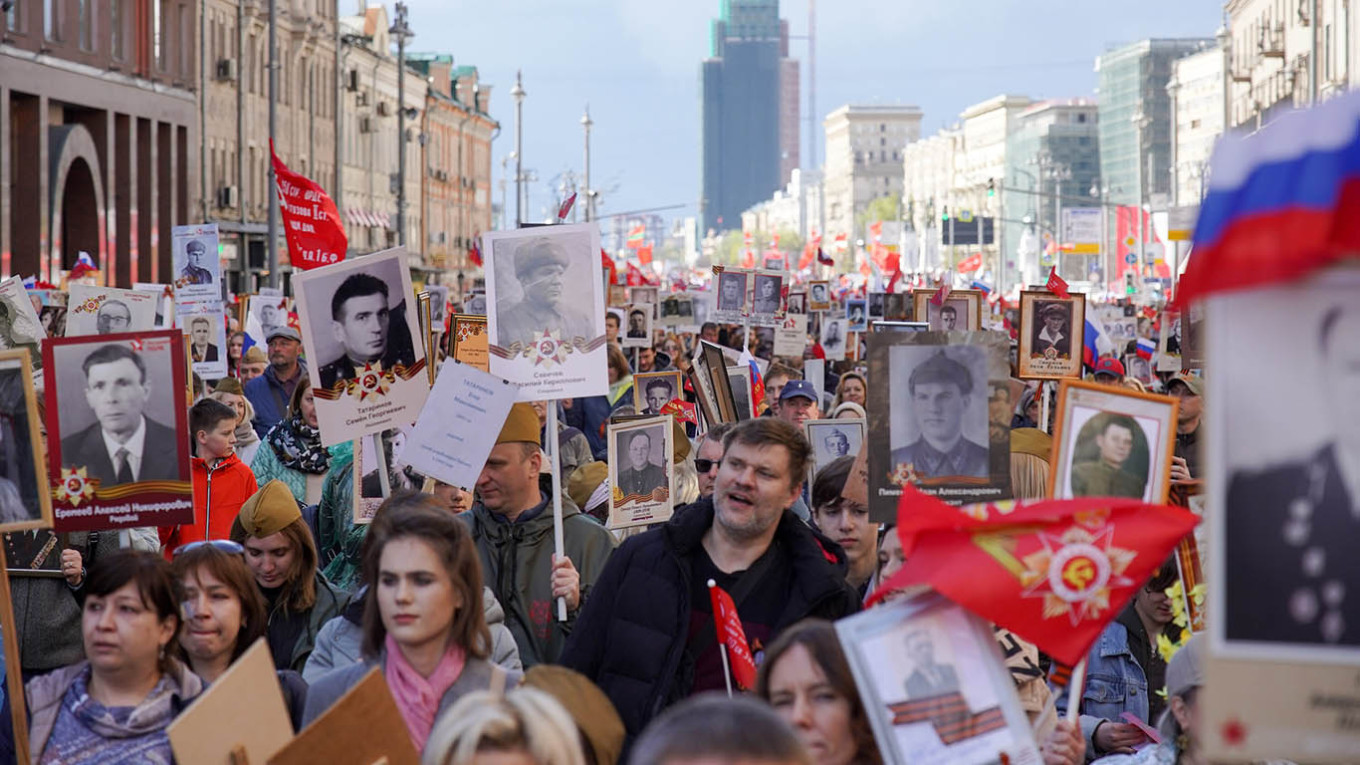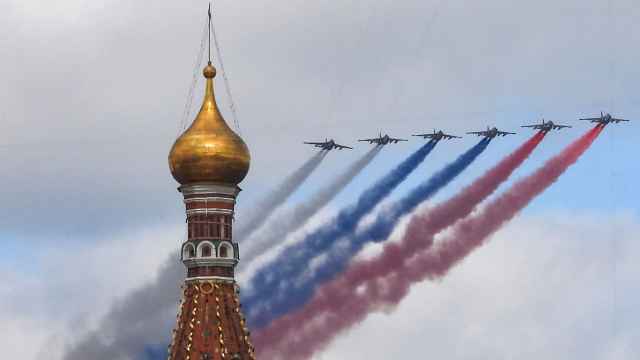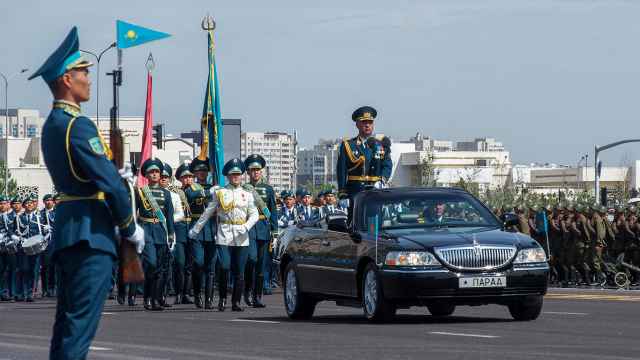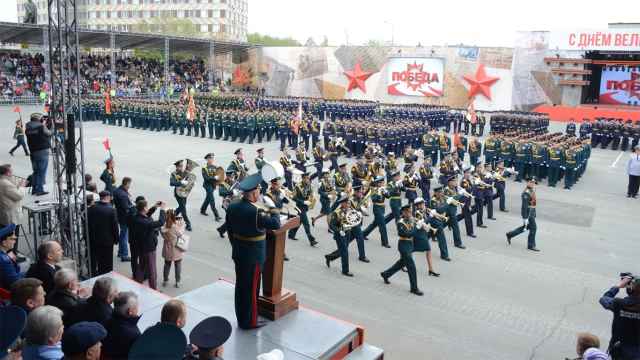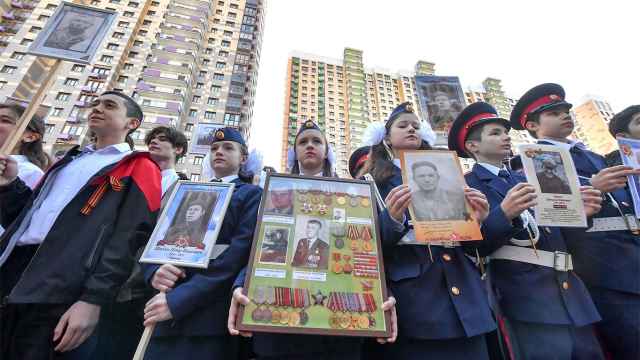On Sunday, in cities as geopolitically disparate as Washington, Calcutta, Frankfurt, Caracas, Rome and Paris, hundreds of members of the Russian diaspora and migrant community gathered to perform the Immortal Regiment. In some cases, it was the first time the event — nominally about remembering the Soviet sacrifice in World War II — had been held since the pandemic.
As always, the attendees marched in coordinated processions, holding aloft portraits of Soviet soldiers, wrapping themselves in orange-and-black St. George’s ribbons, playing Soviet military songs and even dressing children in stylized Red Army uniforms.
Perhaps to some uninitiated observers, the scene looks like nothing more than a jingoistic ritual. A militaristic cultural expression that, while visually intense, lacks immediate meaning.
But the Immortal Regiment marches are far from a civic or spontaneous expression of personal memory. They are organized by the Kremlin through cultural fronts such as Russia House and Volunteers of Victory, which distribute propaganda briefs and hand out St. George’s ribbons.
Make no mistake. This is a Kremlin orchestration, cultivated within Russia and exported to sow Moscow’s narratives into the commemorative landscapes of foreign nations.
That the Immortal Regiment did not begin this way makes its transformation all the more insidious. When the initiative was first launched in 2012 by independent journalists in Tomsk, it offered an open, non-partisan commemorative space for those who had lost family in World War II.
By 2015, however, a hostile takeover by a Moscow assembly official absorbed the movement into the state’s commemorative machinery, transforming it from grassroots mourning into a curated state ritual. Its founders, now dissidents to the cause, have repeatedly warned of how their initiative was seized and distorted by a regime that does not mourn the dead but weaponizes them.
What began as a civic gesture has become a tool of foreign policy and internal legitimacy — a ritual that collapses the emotional legacy of World War II into the ideological framework of the Russian state’s ongoing war crimes.
The symbolic logic of this transformation is clearest in the saturation of St. George’s ribbons. The historical ambiguity of this emblem has been systematically erased and replaced by a singular meaning: loyalty to the militarized Russian state.
In 2025, these ribbons no longer evoke only the honor of the Soviet war effort, itself a complex and often coercive experience for many of its participants. Today, they mark the wearer as a participant in a state project that reanimates this victory in service of the current war. Specifically, in the context of Russia’s ongoing war against Ukraine, the ribbon functions not as a commemorative gesture but as a contemporary pledge — an acceptance of the Kremlin’s claims to moral authority through historical inheritance.
This is not just about symbols. It is about transmitting the kinds of messages Russia wants the world to be discussing. The Immortal Regiment functions abroad as a narrative diversion — a way to displace uncomfortable present truths with emotionally resonant historical half-truths. Instead of confronting Russia’s bombardment of civilians from Kharkiv to Kherson, recruitment of children as unwitting suicide bombers or the cold sadism of the Taganrog torture camp for disappeared Ukrainians, international observers are drawn into a debate about whether the West is trying to “ban the memory of Victory over Nazism.”
This is not incidental — it is the whole point. In Russia’s version of narrative warfare, keeping the global conversation centered on 1945 insulates 2022-2025 from moral scrutiny.
Equally cynically, the Kremlin’s projection of the Immortal Regiment abroad is used to bolster domestic legitimacy. Russian state media frames these processions in Western capitals as evidence that the world still honors Russia’s sacrifice and, by implication, tacitly endorses — or is coming to endorse — Russia’s moral framework, in which opposition to Russian power is equated with support for fascism. Diaspora participants, some of whom no doubt oppose the war and simply wish to honor family, are instrumentalized as evidence of international solidarity. They become part of a closed feedback loop that justifies new atrocities in the language of old heroism.
There are, of course, people who argue for blanket bans. There are cases, particularly in nations facing conventional or hybrid attack from Russia, where such bans are essential. Yet, in Western capitals, a crackdown and censorship would play into the Kremlin’s rhetorical game. Naked prohibition enables propaganda. It would allow the Russian state to position itself once again as the misunderstood victor of World War II, shunned not for its present aggression but for its historical righteousness. This is a debate the Kremlin is more than willing to have. It distracts, deflects and reassures its domestic population that, in moral terms, Russia remains on the side of the just.
A more subtle response would be to reclaim the Immortal Regiment, replacing it with rituals that serve memory and truth. An ideal response would not merely reject the Immortal Regiment — it would illustrate the latter’s disrespect for the dead by offering a replacement and contrast: a space of memory and mourning for the eastern front of WWII, free of glorification and state symbols. A civic, apolitical space that allows for real remembrance — not only of Russian Soviet soldiers, but of Jewish, Ukrainian, Belarusian, Polish and other victims of WWII. It should not be a display of state triumph but of personal tragedy.
Such a remembrance would help to resist the instrumentalization of history. It would refuse the premise that grief must serve glory. It would acknowledge that the Allied victory is not Russia’s to own or allot. It belongs to dozens of nations. Over 7 million Ukrainians served in the Red Army and many of their descendants are today a new wave of brutal invaders. They deserve protection from jingoistic parades in European capitals besmirching their grandparents’ sacrifice and vilifying their own heroism.
Russia has desecrated the Victory banners of 1945 by raising them over destroyed Ukrainian cities and comparing the annihilation of peaceful civilians to the defeat of Nazism. To stand beside the Russian state’s commemorative apparatus is not to honor those who fought against fascism. It is to degrade their memory.
For those who understand this, a new commemorative approach can be taken — one that acknowledges not only the heroism of those who fought Nazism and the overwhelming horror of WWII, but also the recurrence of barbarism in Europe today, in banal and sadistic forms alike. All of which Russia’s war on Ukraine exemplifies.
The dead deserve a rest from propaganda. Let memory remain, but let it be held with mourning, not mobilization. Let commemoration be in service of the truth about war and the urgent need to resist, fight and stop any who choose to unleash the horrors of war once again.
A Message from The Moscow Times:
Dear readers,
We are facing unprecedented challenges. Russia's Prosecutor General's Office has designated The Moscow Times as an "undesirable" organization, criminalizing our work and putting our staff at risk of prosecution. This follows our earlier unjust labeling as a "foreign agent."
These actions are direct attempts to silence independent journalism in Russia. The authorities claim our work "discredits the decisions of the Russian leadership." We see things differently: we strive to provide accurate, unbiased reporting on Russia.
We, the journalists of The Moscow Times, refuse to be silenced. But to continue our work, we need your help.
Your support, no matter how small, makes a world of difference. If you can, please support us monthly starting from just $2. It's quick to set up, and every contribution makes a significant impact.
By supporting The Moscow Times, you're defending open, independent journalism in the face of repression. Thank you for standing with us.
Remind me later.



